
- •Английский язык Базовый курс
- •Contents
- •Вводно-фонетический курс 1. Listen and repeat. The English Alphabet
- • 2. Listen to the alphabet song. Learn it. Основные знаки фонетической транскрипции
- •Дополнительные знаки фонетической транскрипции
- •Правила чтения гласных
- •24. Read.
- •Основные правила чтения согласных букв
- • 37. Listen and repeat.
- •Unit 1 Hello!
- • II. Complete the questions.
- •I II. Match the questions with suitable answers.
- •IV. Look at John f.Smith’s card and answer the questions.
- •V. Make up your own card. VI. Read and listen to Paola’s letter to David, her penfriend.
- •I I. Read the descriptions of two of the people in the picture. Can you guess who they are?
- •III. Imagine it is possible to choose the way your child looks. Tell about your choices. Begin with “I’d like …..”. You should mention his:
- •IV. Match the adjectives with their definitions.
- •III. Can you tell about Russian families? The questions and expressions in the box can help you.
- •IV. Put the story in the most likely order.
- •V. Can you tell your or your parents’ love story?
- •VI. Look at the table below and tell about the people.
- •Unit 5 Somewhere to live
- •I. Read the descriptions of different houses and complete the table below.
- •II. Imagine that you are going to buy a new house. Which of the factors given are important for you. Explain your choices.
- •III. Look at the items of furniture in the box. Which rooms do they go in? Which can go in any room? Add your own words.
- •IV. Here are three descriptions of bedrooms. Read the descriptions and match each to a plan.
- • V. Listen to the description of the kitchen and fill in the gaps.
- •II. Think of the first hour of your day. Tick () what you usually do. Add your own ideas.
- • III. Read and listen to the texts.
- •IV. Complete the sentences about Sister Mary and Hans.
- •V. Read about Ann McGregor’s routine.
- •VI. Write the questions to the answers given.
- •VII. Read about Ann’s weekends and fill in the gaps with the correct form of the verbs in the box.
- •VIII. Ask and answer about these people’s routines.
- •II. Read the passages below where some people talk about their leisure activities.
- •III. Are the sentences true or false? Correct the wrong ones.
- •III. Fill the gaps with the words from the box.
- •Living in the city
- •II. Where would you like to live? Why? Write about advantages and disadvantages living there using the table below.
- •III. Which four of these adjectives describe your home town best? Write why.
- •IV. Imagine you’re visiting some town as a tourist. Write a letter home saying what you think of the place. V. Complete the sentences. Then listen and check. Practise saying some of the sentences.
- •VI. When you are in an unknown town/city it is very easy to get lost there. Remember the expressions which are often used when asking and giving directions.
- • VII. Listen to the conversations and complete them.
- •VIII. Make up dialogues using the situations and the guide words given below.
- •Meals in Britain
- •III. Are the sentences true (t) or false (f)? Correct the false sentences.
- •VI. Choose the right answer.
- •V. Read the following rules. Can you add any other rules? Good Rules to Remember
- •VI. Agree or disagree with the statements using the expressions given.
- •IV. Think of your school. How much do you remember? The following questions may be helpful to you.
- •V. Look at the table below and tell how the people spent last summer/winter.
- • III. Answer the questions about Gemma. Then listen and check your answers.
- •IV. Match the resolutions with the reasons.
- •II. Read the following situations and answer the questions.
- •No dogs
- •III. Match the questions with the gaps. Make up the questions to the rest of the gaps. What do you think the answers may be?
- •IV. Read the following stories and suggest what happened next.
- •I. Translate into your language:
- •II. Look at the information about one family and complete the sentences about the people.
- •Существительное в функции определения
- •I. Translate into your language:
- •Личные местоимения
- •I. Replace the subject of the sentence with he, she, it or they.
- •II. Finish the sentences with him/her/them…
- •III. Complete the sentences. Use I/me/you/she/ her etc.
- •IV. Complete the sentences. Use I/me/he/him...
- •Притяжательные местоимения
- •I. Put in my/our/your/his/her/their/its.
- •II. Finish these sentences. Use friend(s) of mine/yours etc.
- •Неопределенные местоимения some, any, no
- •I. Put in some or any.
- •III. Complete the sentences. Use some or any.
- •IV. Write these sentences again with no.
- •Неопределенные местоимения much, many, little, few
- •I. In this exercise you have to use much or many.
- •II. Complete these sentences with little/ a little/ few/ a few.
- •III. Some of the sentences are right but some are wrong. Correct them.
- •IV. Fill in the gaps with much/many, few/little.
- •Числительное
- •I. Say the numbers.
- •Предлоги
- •I. Write at/on/in if necessary.
- •II. Put in from...To/since/for.
- •III. Put in during/for/while ( в то время как, пока).
- •V I. Somebody asks you the way to a place. You say which way to go. Look at the pictures and write sentences beginning Go... Глагол to be
- •II. Put in there is/there isn't/ there are /there aren't/ are there
- •Глагол to have
- •I. Put in have (not) or has (not).
- •II. Write questions.
- •III. Answer the following questions like in the pattern:
- •Простое повествовательное предложение
- •I. Is the word order right or wrong? Correct the sentences that are wrong.
- •II. Put the parts of the sentence in the right order.
- •Вопросительные предложения
- •I. In this exercise you have to write questions. A friend has just come back from holiday and you are asking him about it.
- •II. This time you have to make questions with who or what.
- •III. Put the questions to the underlined words.
- •The present simple tense
- •I. Write down the third person singular of these verbs.
- •II. Complete the sentences using the verbs from the box.
- •III. Write the negative.
- •IV. Complete the sentences. Use the present simple.
- •V. Write the sentences from the words given.
- •VI. Complete the questions.
- •Степени сравнения прилагательных и наречий
- •I. Complete the table with comparative and superlative forms.
- •II. Rewrite each sentence using an opposite adjective.
- •III. Complete the sentences. Use a comparative.
- •V. Complete the sentences. Use 'than'.
- •VI. Complete the sentences with a superlative and prepositions.
- •VII. Complete the sentences with the suitable form of the adjectives in the brackets.
- •VIII. Here are some questions for you to answer. But you have to write the questions using the words in brackets. Then answer them.
- •IX. Write sentences with as .... As.
- •X. Translate the following sentences with 'the..... The'.
- •The present continuous tense
- •II. Which is right?
- •III. Put the verb in the present simple or the present continuous.
- •IV. Use the words in brackets to write sentences.
- •The past simple tense
- •I. In this exercise you have to read a sentence about the present and then write a sentence about the past.
- •II. Complete the sentences. Put the verb into the correct form, positive or negative.
- •III. Read about Lisa’s journey to Madrid. Put the verbs from the box in the correct form.
- •IV. Ask questions using the past simple.
- •The past continuous tense
- •I. Here is the list of some things that Ann did yesterday.
- •II. Put the verb into the Past Continuous.
- •III. Put the verbs into the past continuous or past simple.
- •IV. Put the verb into correct form, past continuous or past simple.
- •Модальные глаголы
- •I. Answer these questions, using the following word combinations.
- •II. Complete these sentences with must or have to (in the correct form). Sometimes it is possible to use either, sometimes only have to is possible.
- •III. Write sentences with I (don’t) think ….. Should …..
- •Способы выражения будущего действия
- •II. Use ‘to be going to’ instead of the Infinitives.
- •III. Complete the sentences using will or going to.
- •IV. Which is correct?
- •The present perfect tense
- •I. You are writing a letter to a friend and giving news about people you both know. Use the words given to make sentences and put the verb into the correct form.
- •II. Read the situations and write sentences. Use the words from the box.
- •III. Answer the questions using the words in brackets.
- •IV. In this exercise you have to make questions with the words given.
- •V. Using the words given write one sentence in the present perfect and one in the past simple.
- •VI. In this exercise you have to put the verb into the correct form, Present Perfect or Past Simple.
- •VII. Write complete sentences. Use the present perfect and the past simple.
- •VIII. Write questions to the answers given. Use the present perfect or the past simple.
- •Bibliography
II. Read the passages below where some people talk about their leisure activities.


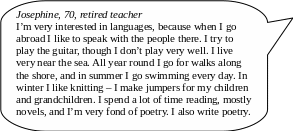
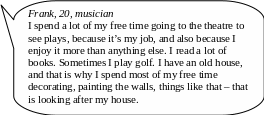
III. Are the sentences true or false? Correct the wrong ones.
Josephine plays the guitar very well.
Peter’s hobby is cooking for people.
Laura has very little free time.
Frank hates going to the theatre.
Laura has a large collection of soft toys.
Josephine likes walking along the shore.
Frank spends a lot of his spare time looking after his house.
Peter enjoys reading poetry.
Josephine writes science fiction.
Peter likes walking in the nearest forest.
Frank plays golf occasionally.
Laura is fond of playing different musical instruments.
IV. Here are some descriptions of different hobbies. Can you guess what the hobby is in each case?
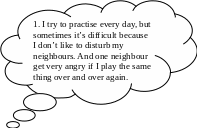
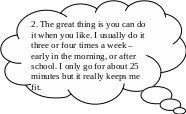

V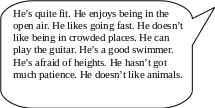 .
Read about the person in the bubble. Would he enjoy the following
activities? Why? Why not?
.
Read about the person in the bubble. Would he enjoy the following
activities? Why? Why not?
parachute jumping;
water skiing;
knitting;
horse riding;
fishing;
stamp collecting;
playing in a band.
What about you? Which of these activities would you enjoy?
UNIT 8
Going Places
I. Look at the picture. Can you find the following in it?
-
bus
road
sidewalk
traffic sign
traffic lights
driver
first-aid kit
junction
car
pedestrians
passengers
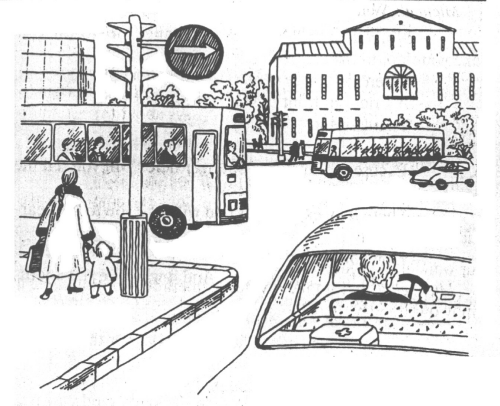
Which forms of public transport do you use?
Which do you use most?
Which transport do you prefer? Why?
II. Read the text and memorize the underlined words.
People use various means of communication to get from one place to another. When getting about town one can go by bus, by tram, by trolley-bus or by the underground. The underground is very popular with the citizens. It’s the fastest and most convenient way of going about town. If you have to travel a short distance you may take a bus, a tram, a trolley-bus or go on foot. If there’s no direct bus to your destination you’ll have to change on to another bus. When we travel on buses (trams, etc.) we have to pay fare, which doesn’t depend on the distance you go. If there are many cars in the town we say that the traffic is heavy. If the vehicles are few we say that the traffic is light. The traffic is especially heavy in the rush hour, that is in the morning when people are coming back home. At this time the public transport is overcrowded.
III. Fill the gaps with the words from the box.
-
suburbs
avenue
guidebook
rush hour
packed
cities
traffic jam
A wide street is called an .....
It was eight o’clock, the middle of the ......., so it soon created a terrible......
When a bus is full of people we say that it is .....
Areas outside the center of town where people live are .....
Big towns are often called .....
In order not to get lost you should have a .....
IV. Look at the remarks in the table and say which kind of transport they describe.
-
They’re comfortable.
They usually come on time.
You don’t have to wait long.
It’s an enjoyable way to travel
They’re expensive.
They’re often crowded.
It’s a safe way to travel.
They’re slow.
V. Three people say how they get from Washington to New York. Fill the gaps with words from the box.
costs reaches gets takes leaves arrives
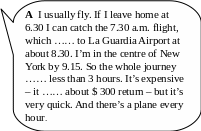
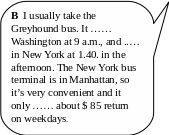

VI. What are the advantages and disadvantages of going by different kinds of transport? Use the expressions given. Compare travelling by…
p
 lane
and car;
lane
and car;train and bus.
UNIT 9
About Town
Do you live and/or work in a city? Is it very big?
How many advantages and disadvantages of city life can you think of?
I. Read the text and think of advantages and disadvantages of city life.
